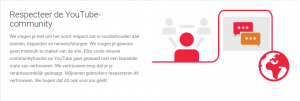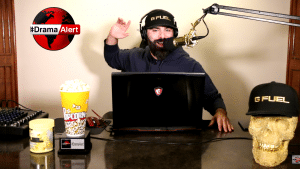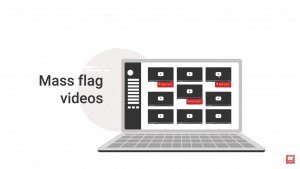It is easier than ever to produce and distribute your own videos. Every minute, more than 300 hours of videos are uploaded to YouTube. Is this gigantic amount still manageable? No. The video platform has become too big to continue to exist smoothly.
By Nuno Blijboom
There is no better source for cat videos, bullying vloggers and gaming youngsters than YouTube. Every day, more than a billion users collectively watch hundreds of millions of hours of videos - and that's not counting visitors without an account. YouTube is so prevalent and user-friendly that even the NPO programmes for makes. This all sounds nice and all, but there is also a downside to this growth and size.
Regulation on YouTube
After all, how do you make sure that all videos adhere to the guidelines and terms of use? Since the beginning, the website has had the so-called 'community guidelines', some basic rules to follow in their own words "Keeping YouTube fun and safe for everyone." These rules boil down to "behave normally", "don't cross the line in your videos" and "we are a community together, so please join in.

Given the size and simplicity with which YouTube videos can be viewed, content regulation is particularly important. After all, we don't want children to come into contact with inappropriate images just like that - Kijkwijzer exists for a reason. YouTube specifies seven different rules you have to abide by as an uploader. No nudity or sexual content, nor violent or explicit videos. Hateful or threatening content is also out of the question, as is incitement to dangerous or harmful behaviour. Spam, deception and violating copyright are obviously not allowed either.
Little enforcement
Unfortunately, last year showed that these rules are quite easy to circumvent. Daniel Keem, better known online as Keemstar, caused quite a few uproar. He accused 'Tony', a 62-year-old streamer[hints]A streamer is someone who makes live videos, often while gaming[/hints], wrongly accused him of paedophilia and urged his fans to harass him en masse. The result: ten thousand comments, including a huge mountain of death threats and the dissemination of his personal information. What did YouTube do? Nothing.

Calvin Vail, under the pseudonym Leafyishere several videos in which he featured a YouTuber with Down syndrome ridiculed. His fans also started harassing the YouTuber in question, sending him thousands of messages with the abbreviation 'kys': kill yourself.
A final example is YouTuber Joey Salads: he put several social experiments in scene, in which, among other things, he portrayed the Black Lives Matter movement as a violent and irrational group. He also had a group of African-American actors plaster a car with Trump stickers smashing. The comments were full of racist slurs and jokes, and the word 'nigger' was liberally sprinkled around.
Taking matters into your own hands
The above channels are still active and just a small sample of the many channels that violate YouTube's rules. The copyrights of many film and television studios have also been violated for years. YouTubers like Nick from Fulham are notorious for uploading many British TV programmes. There is even a website called Full Movies on YouTube, but still YouTube itself does not intervene. The lion's share of films and series are still online, and as stated above, many hateful and bullying channels are still active. So creators on YouTube decided to take matters into their own hands.

Indeed, 2016 also saw the exponential growth of critical creators like Ethan Klein (H3H3Productions) and iDubbbzTV. They made critical and angry videos about Keemstar, Leafyishere and Joey Salads, among others. These online vigilantes exposed the rule-breakers and showed that YouTube itself was doing too little. Even though these bullies and haters are still active, they can no longer go unseen and without thousands of dislikes their way.
What can YouTube do?
How can YouTube avoid this in the future? That's going to be pretty difficult, I'm afraid. When more than 300 hours of footage is uploaded per minute, it is impossible to check whether the rules are being followed with manpower alone. The most obvious solution then seems to be automated enforcement. For the unlawful use of music, this is already applied. If a computer programme detects copyright-protected music, the relevant video is automatically muted in its entirety.

But the rise and efficiency of critical channels has also set YouTube on a different path. Since September 2016, they have wanted to give more power to users, under the new initiative YouTube Heroes. Users could previously indicate when videos broke the rules, but when you sign up as a Hero, you can also get points for it. The more points, the more power and influence you have. With more than 100 points, you can take down videos en masse. And with 400 points, you can interact directly with YouTube employees, a privilege that even the biggest YouTube channels don't have.
Unjustified trust
The problem with this initiative is that in doing so, YouTube puts the trust in the hands of the same group of people who urge mentally challenged people to commit suicide. These are the same trolls and commenters who actually get in the way of the 'cosy YouTube community'. YouTube-vigilante Ethan Klein put a critical video online right away two days after the unveiling of YouTube Heroes.
According to him, the flagging system is already being abused in its old form. When a video is flagged often enough, YouTube automatically takes it down. With some regularity, users mass-mark videos they simply disagree with. Only when the uploader indicates that it is wrong, someone from YouTube looks at it to see if it is indeed breaking the rules. Unfortunately, few uploaders know that they can report this to YouTube and thus get their videos back online. According to Klein, the YouTube Heroes system only makes this abuse easier.
No choice
Rather give these privileges and rights to the content creators exposing these transgressions and abuses. Makers like Philip DeFranco and Ethan Klein have already shown that they would do well to have these privileges and power without abusing them.
Yet YouTube seems to have no other choice. Klein's suggestion that this be done by neutral, paid staff is unfortunately not feasible. The website has grown too big to oversee with paid manpower. They do have to rely on voluntary contributions from users around the world. They can do nothing but hope that the YouTube Heroes don't become YouTube Villains. Because if that happens, if the followers of Keemstar and Leafyishere can suddenly call the shots, then YouTube will soon be finished.
